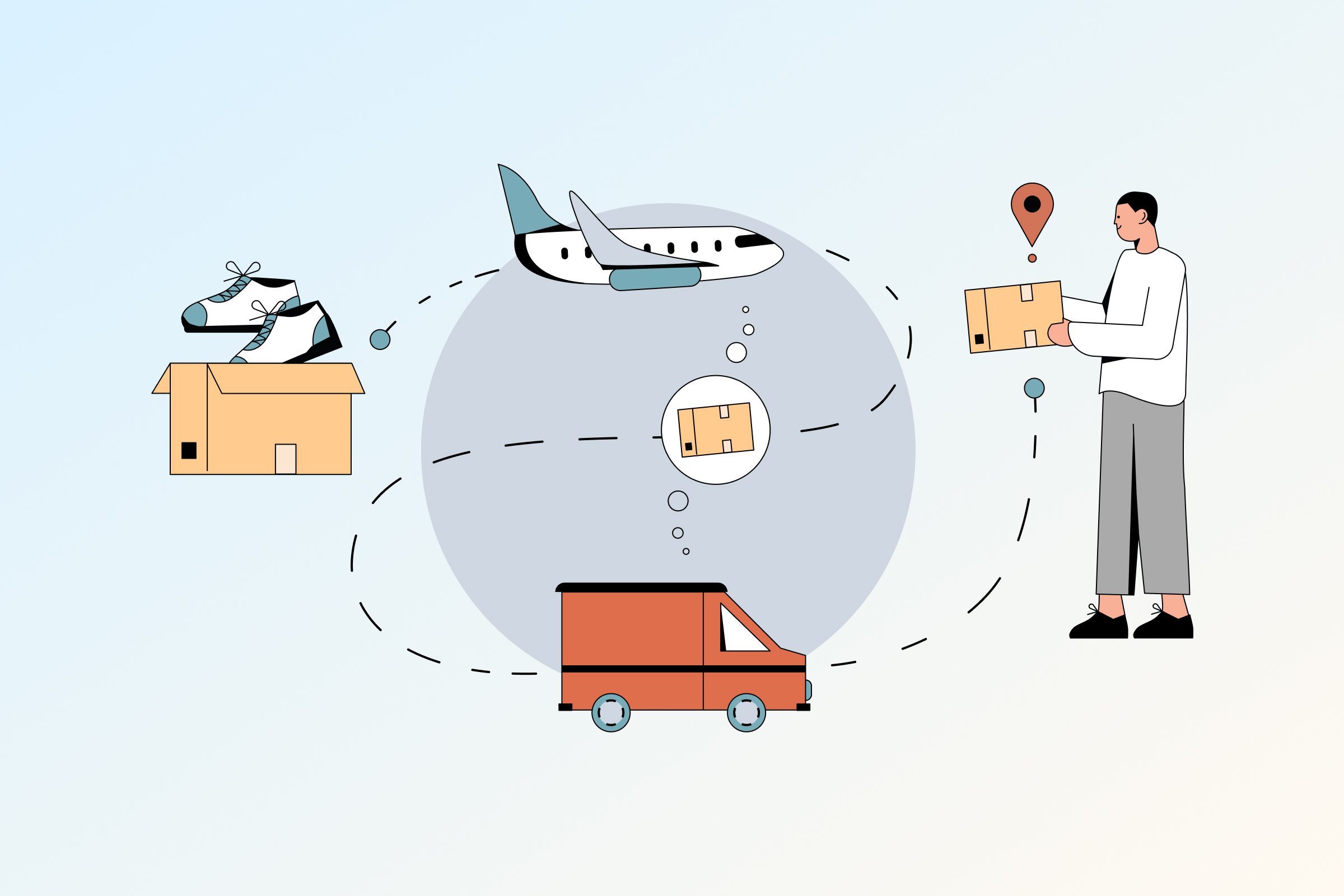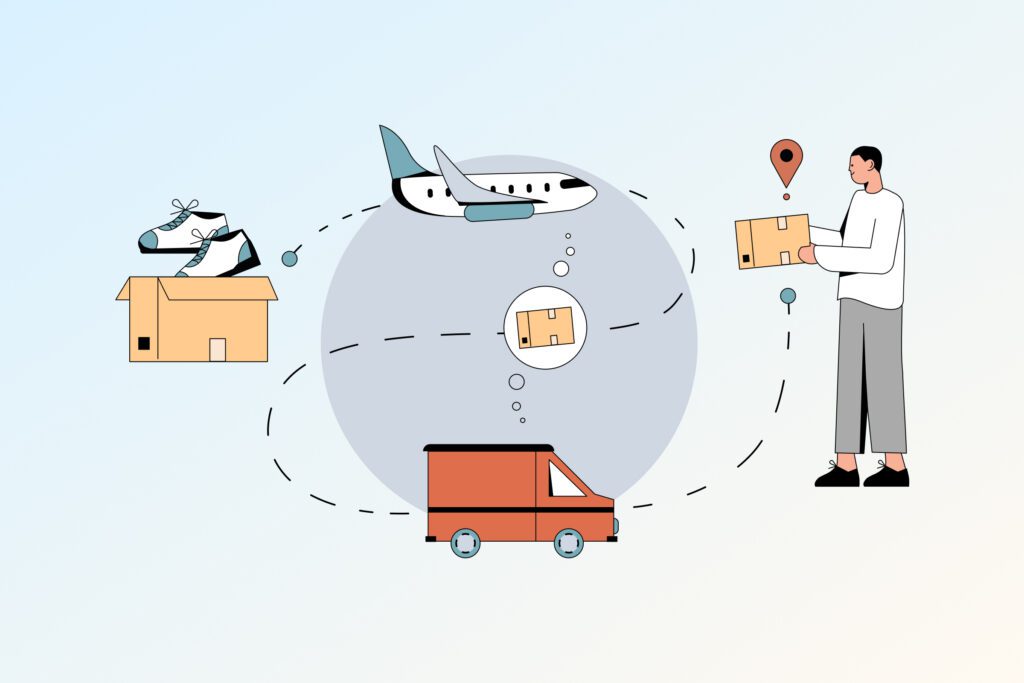
Ecommerce shipping stands as the pivotal bridge between online retailers and customers, encompassing the entire process of getting products from the seller to the buyer’s doorstep. In today’s digital marketplace, understanding the intricacies of e-commerce shipping is fundamental for businesses aiming to thrive. This essential logistics component encompasses various stages, from order fulfillment to delivery, and significantly influences customer satisfaction and the success of online ventures.
What is ecommerce shipping?

E-commerce shipping refers to the process of transporting goods purchased online from the seller to the buyer’s specified delivery address. It encompasses all the stages involved in fulfilling an online order, starting from the moment the customer completes the purchase to the final delivery of the product.
Why ecommerce shipping is important
E-commerce shipping plays a vital role in the success of online businesses and significantly impacts customer satisfaction and retention. Here are five reasons why e-commerce shipping is crucial:
Customer Experience
Shipping directly affects the customer experience. Fast, reliable, and affordable shipping methods contribute to customer satisfaction. Customers expect timely delivery and transparent tracking information. A positive shipping experience can lead to customer loyalty and positive reviews, while a poor shipping experience may result in customer dissatisfaction and potential loss of business.
Competitive Advantage
In the highly competitive e-commerce landscape, shipping can be a key differentiator. Offering free or discounted shipping, expedited delivery options, or other innovative shipping solutions can set a business apart from its competitors and attract more customers.
Cart Abandonment Mitigation
High shipping costs or unexpected shipping fees during the checkout process often lead to cart abandonment. Streamlining shipping costs, offering transparent shipping fees upfront, or providing incentives such as free shipping thresholds can reduce cart abandonment rates, thereby increasing conversions and revenue.
Brand Reputation
Efficient shipping processes contribute to a positive brand reputation. Consistently meeting delivery expectations and providing a smooth shipping experience can build trust and credibility for the brand. Conversely, shipping delays, damaged goods, or poor packaging can tarnish a brand’s image and lead to negative customer feedback.
Global Reach and Market Expansion
Seamless e-commerce shipping facilitates market expansion on a global scale. Businesses can reach customers in different geographic locations and tap into new markets. Establishing reliable international shipping methods can open doors to a broader customer base and increased sales opportunities.
Overall, e-commerce shipping is a crucial aspect that directly influences customer satisfaction, brand reputation, and the ability to stay competitive in the market. By prioritizing and optimizing shipping processes, businesses can enhance their overall performance and drive success in the online retail space.
Ecommerce shipping methods and strategies

There are various e-commerce shipping methods and strategies that businesses employ to optimize their shipping processes. Here are five commonly used methods and strategies:
Free Shipping
Offering free shipping is a powerful strategy to attract customers and increase sales. Businesses may absorb shipping costs into the product prices or set thresholds (like minimum order amounts) for free shipping. This approach can reduce cart abandonment rates and incentivize customers to make purchases.
Flat Rate Shipping
With flat rate shipping, customers pay a fixed shipping fee regardless of the weight or size of the package. This method simplifies the checkout process, providing transparency and predictability for customers. It’s particularly effective for businesses dealing with a wide range of product sizes and weights.
Real-Time Carrier Rates
Integrating real-time carrier rates allows customers to select their preferred shipping method based on carrier rates calculated in real time. This provides accurate shipping costs based on the package weight, dimensions, and destination. It gives customers flexibility and transparency while ensuring businesses charge the exact shipping cost.
Expedited Shipping Options
Providing expedited shipping options for customers who need their products quickly can be a competitive advantage. Offering choices such as next-day or two-day shipping caters to those willing to pay more for faster delivery. It’s essential for time-sensitive orders and can boost customer satisfaction.
Local Fulfillment and Same-Day Delivery
Utilizing local fulfillment centers and same-day delivery services can significantly enhance the customer experience. By storing inventory in strategic locations closer to the customers, businesses can fulfill orders faster, reducing shipping times. Same-day delivery, where feasible, can be a major selling point, particularly for urban areas.
These shipping methods and strategies can be used individually or in combination, depending on the business model, target audience, and the nature of the products being sold. Each strategy comes with its own set of advantages and considerations, and businesses often tailor their shipping approaches to meet their specific goals and customer needs.
E-commerce shipping options for small businesses

Small businesses often need flexible and cost-effective shipping options to meet their customers’ needs while keeping operational expenses manageable. Here are five e-commerce shipping options suitable for small businesses:
USPS (United States Postal Service)
USPS offers various shipping services, including First-Class Mail, Priority Mail, and Priority Mail Express. It’s particularly beneficial for small, lightweight packages. Small businesses can take advantage of USPS’s flat-rate options and online discounts, making it an affordable choice, especially for domestic shipments.
UPS (United Parcel Service)
It provides a range of services suitable for small businesses, offering reliable domestic and international shipping options. UPS also offers discounted rates for businesses, and their services include options like UPS Ground, UPS 2nd Day Air, and UPS Next Day Air.
FedEx
FedEx is another popular choice for small businesses due to its diverse shipping options. Small businesses can utilize services like FedEx Ground for cost-effective shipping within the U.S., FedEx Express for faster deliveries, and FedEx International for global shipments.
Flat Rate Shipping
Implementing flat-rate shipping options allows small businesses to simplify the shipping process. Both USPS and private carriers like UPS and FedEx offer flat-rate options where packages are shipped at a predetermined rate, regardless of weight or size, making it easier for businesses to calculate and present shipping costs to customers.
Regional Carriers or Local Delivery Services
Small businesses can also explore regional carriers or local delivery services that might offer competitive rates and personalized services within specific areas or regions. Partnering with these carriers can often provide more tailored and affordable shipping options, especially for local deliveries.
Small businesses need to assess their specific needs, budget constraints, and customer demands to determine the most suitable e-commerce shipping options. Additionally, leveraging online tools and services from these carriers can often provide discounts and streamlined shipping solutions tailored to small business requirements.